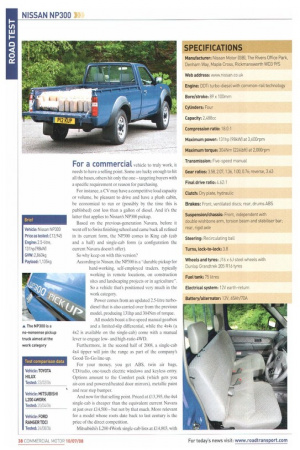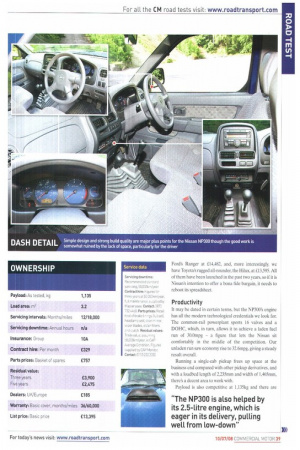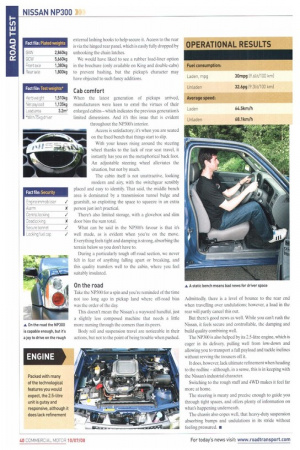For a commercial vehicle to truly work, it needs to
Page 38

Page 39

Page 40

If you've noticed an error in this article please click here to report it so we can fix it.
have a selling point. Some are lucky enough to hit all the bases, others hit only the one — targeting buyers with a specific requirement or reason for purchasing.
For instance, a CV may have a competitive load capacity or volume, be pleasant to drive and have a plush cabin, be economical to run or (possibly by the time this is published) cost less than a gallon of diesel. And it's the latter that applies to Nissan's NP300 pickup.
Based on the previous-generation Navara, before it went off to Swiss finishing school and came back all refined in its current form, the NP300 comes in King cab (cab and a half) and single-cab form (a configuration the current Navara doesn't offer).
So why keep on with this version?
According to Nissan, the NP300 is a "durable pickup for hard-working, self-employed traders, typically working in remote locations, on construction sites and landscaping projects or in agriculture". So a vehicle that's positioned very much in the work category.
Power comes from an updated 2.5-litre turbodiesel that is also carried over from the previous model, producing 131hp and 304Nm of torque. All models boast a five-speed manual gearbox and a limited-slip differential, while the 4x4s (a 4x2 is available on the single-cab) come with a manual lever to engage lowand high-ratio 4WD.
Furthermore, in the second half of 2008, a single-cab 4x4 tipper will join the range as part of the company's Good-To-Go line-up.
For your money, you get ABS, twin air bags. CD/radio, one-touch electric windows and keyless entry. Options amount to the Comfort pack (which gets you air-con and powered/heated door mirrors), metallic paint and rear step bumper.
And now for that selling point. Priced at £13,395, the 4x4 single-cab is cheaper than the equivalent current Navara at just over £14,500— but not by that much. More relevant for a model whose roots date back to last century is the price of the direct competition.
Mitsubishi's L200 4Work single-cab lists at £14,803. with Ford's Ranger at £14,482, and, more interestingly, we have Toyota's rugged all-rounder, the Hilux, at £13,595. All of them have been launched in the past two years, so if it is Nissan's intention to offer a bona fide bargain, it needs to reboot its spreadsheet.
Productivity
It may he dated in certain terms, but the NP300's engine has all the modern technological credentials we look for. The common-rail powerplant sports 16 valves and a DOHC, which, in turn, allows it to achieve a laden fuel run of 30.0mpg — a figure that lets the Nissan sit comfortably in the middle of the competition. Our unladen run saw economy rise to 32.6mpg, giving a steady result overall.
Running a single-cab pickup frees up space at the business end compared with other pickup derivatives, and with a loadbed length of 2,235mm and width of 1,465mm, there's a decent area to work with.
Payload is also competitive at 1,135kg and there are external lashing hooks to help secure it. Access to the rear is via the hinged rear panel, which is easily fully dropped by unhooking the chain latches.
We would have liked to see a rubber load-liner option in the brochure (only available on King and double-cabs) to prevent bashing, but the pickup's character may have objected to such fancy additions.
Cab comfort When the latest generation of pickups arrived, manufacturers were keen to extol the virtues of their enlarged cabins — which indicates the previous generation's limited dimensions. And it's this issue that is evident throughout the NP300's interior.
Access is satisfactory; it's when you are seated on the fixed bench that things start to slip.
With your knees rising around the steering wheel thanks to the lack of rear seat travel, it instantly has you on the metaphorical back foot. An adjustable steering wheel alleviates the situation, but not by much.
The cabin itself is not unattractive, looking modern and airy, with the switchgear sensibly placed and easy to identify That said, the middle bench area is dominated by a transmission tunnel bulge and gearshift. so exploiting the space to squeeze in an extra person just isn't practical.
There's also limited storage, with a glovebox and slim door bins the sum total.
What can be said in the NP300's favour is that it's well made, as is evident when you're on the move. Everything feels tight and damping is strong, absorbing the terrain below so you don't have to.
During a particularly tough off-road section, we never felt in fear of anything falling apart or breaking, and this quality transfers well to the cabin, where you feel suitably insulated.
On the road Take the NP.300 for a spin and you're reminded of the time not too long ago in pickup land where off-road bias was the order of the day.
This doesn't mean the Nissan's a wayward handful, just a slightly less composed machine that needs a little more nursing through the corners than its peers.
Body roll and suspension travel are noticeable in their actions, but not to the point of being trouble when pushed. Admittedly, there is a level of bounce to the rear end when travelling over undulations; however, a load in the rear will partly cancel this out.
But there's good news as well. While you can't rush the Nissan, it feels secure and controllable, the damping and build quality combining well.
The NP300 is also helped by its 2.5-litre engine, which is eager in its delivery pulling well from low-down and allowing you to transport a full payload and tackle inclines without revving the trousers off it.
It does, however, lack ultimate refinement when heading to the redline — although, in a sense, this is in keeping with the Nissan's industrial character.
Switching to the rough stuff and 4WD makes it feel far more at home.
The steering is meaty and precise enough to guide you through tight spaces, and offers plenty of information on what's happening underneath.
The chassis also copes well, that heavy-duty suspension absorbing bumps and undulations in its stride without feeling pressured. •








































































































































































